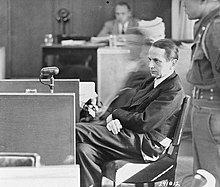
Genocide justification is the claim that a genocide is morally excusable/defensible, necessary, and/or sanctioned by law.[1] Genocide justification differs from genocide denial, which is the attempt to reject the occurrence of genocide. Perpetrators often claim that genocide victims presented a serious threat, justifying their actions by stating it was legitimate self-defense of a nation or state. According to modern international criminal law, there can be no excuse for genocide.[2][3] Genocide is often camouflaged as military activity against combatants, and the distinction between denial and justification is often blurred.[4]
Examples of genocide justification include the Turkish nationalists' claims in regard to the Armenian genocide, the Nazis' justifications behind the Holocaust, anti-Tutsi propaganda during the Rwandan genocide,[5] Serbian nationalists' justifications for the Srebrenica massacre and the Myanmar government's claims about the Rohingya genocide.
- ^ Pruitt, William R. (2017). "Understanding Genocide Denial Legislation: A Comparative Analysis". International Journal of Criminal Justice Sciences. 12 (2): 270–284. doi:10.5281/zenodo.1034674. ProQuest 1967316575.
- ^ Scarre, Geoffrey (December 2005). "Excusing the Inexcusable? Moral Responsibility and Ideologically Motivated Wrongdoing". Journal of Social Philosophy. 36 (4): 457–472. doi:10.1111/j.1467-9833.2005.00288.x.
- ^ Jones, Adam (2006). "Is genocide ever justified?". Genocide: A Comprehensive Introduction. Routledge. pp. 28–30. ISBN 978-1-134-25981-6.
- ^ Ihrig (2016), pp. 12–13.
- ^ Lower, Matthew; Hauschildt, Thomas (2014-05-09). "The Media as a Tool of War: Propaganda in the Rwandan Genocide". Human Security Centre. Retrieved 2021-03-16.
© MMXXIII Rich X Search. We shall prevail. All rights reserved. Rich X Search
